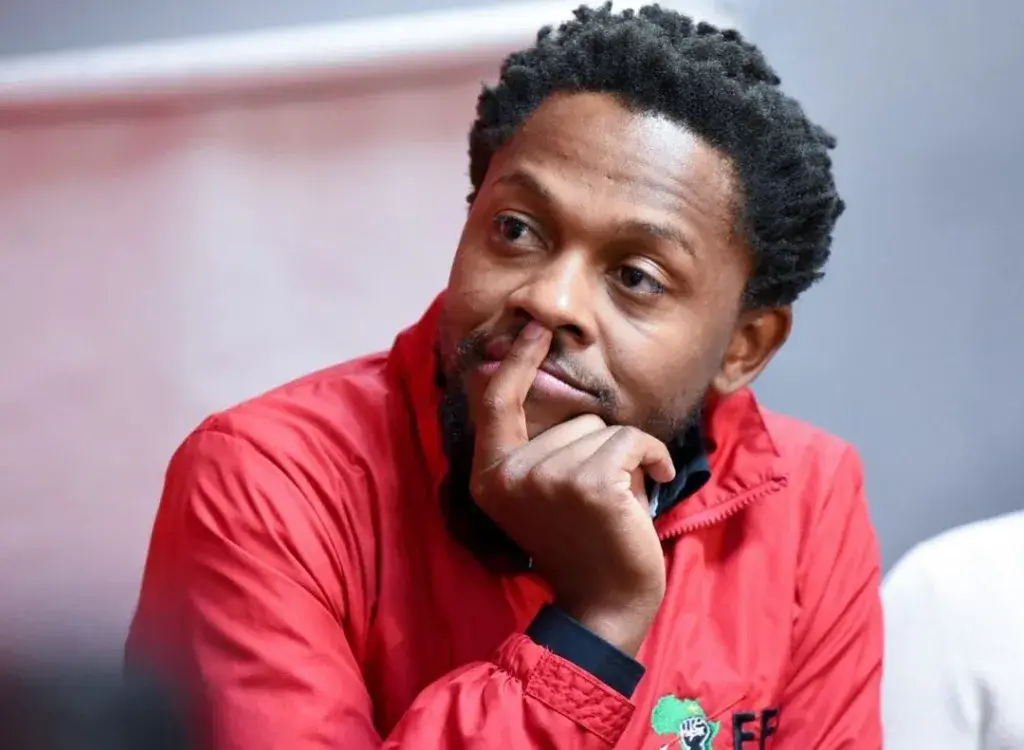The Economic Freedom Fighters (EFF), South Africa’s once-unified, radical force of change, is now experiencing an implosion at an unprecedented rate. High-profile departures, internal discontent, and ideological fractures are surfacing, shaking the party to its core. In response, EFF leader Julius Malema has fired back in characteristic fashion, signaling a ruthless determination to root out any perceived disloyalty. But his statements reveal more than mere frustration—they expose deep divisions within the party, which is facing a potential identity crisis as key figures depart.
The Great Exodus: High-Profile Defections Shake the EFF
The exodus of prominent EFF leaders has been rapid and surprising. In recent months, the EFF has lost two of its most influential figures: former Deputy President Floyd Shivambu and, most recently, former Chairperson Advocate Dali Mpofu. Both have joined the newly formed uMkhonto we Sizwe (MK) Party, leaving Malema and the remaining EFF leadership grappling with a wave of high-profile defections that suggest deep-seated ideological rifts within the organization.
The EFF, a party known for its commitment to economic liberation and social justice, now finds itself in a state of turmoil. With these high-ranking defections, cracks in the EFF’s once-solid foundation have become painfully visible. For supporters and onlookers alike, the implosion of the EFF signals a loss of confidence in the leadership, especially as the MK Party attracts some of its most seasoned and loyal members.
Malema’s Defiant Stand: “Only Two of Your Favorites Remain”
Julius Malema, known for his confrontational style, has responded to these defections with a tone of defiance, singling out EFF members whom he perceives as potential traitors. In a thinly veiled warning, he directed his message at Mbuyiseni Ndlozi, one of the remaining high-profile members, stating, “Only two more of your favorites remain, and the list will be finalized.”
In a chilling rebuke, Malema referenced those who “sing beautifully” and “are always willing to pose for pictures and sign roll calls” but whose “souls are long gone.” The comment signals Malema’s frustration with members who might appear loyal but lack genuine dedication to the party’s core mission. His words imply that some prominent figures are simply going through the motions, while their true commitment to the EFF’s ideology has waned—a perception that only intensifies the sense of disarray within the movement.
“We Remain Standing and Are Not Going Anywhere Under a Criminal Syndicate”
In his response, Malema drew a sharp line between the EFF and its defectors, declaring, “We remain standing and are not going anywhere under a criminal syndicate.” This statement is widely seen as a direct reference to the MK Party, where prominent former EFF members are finding a new political home. Malema’s harsh words reflect not only his disapproval but also a deliberate attempt to discredit the motives and integrity of those who have left.
Malema’s defiance, however, highlights a growing insecurity within the EFF as it faces challenges to its core identity. For a party that prides itself on ideological unity, these defections suggest that some members no longer believe in the EFF’s ability to deliver on its promises. The accusation of aligning with a “criminal syndicate” frames these former members as morally compromised, casting the MK Party in a dubious light. Yet, the MK Party’s success in attracting top EFF figures raises questions about the current state of the EFF’s internal cohesion.
The Unprecedented Implosion of the Red Movement
The EFF is facing what appears to be an unprecedented implosion. Since its founding, the EFF has maintained a fiercely united front, grounded in a shared commitment to economic freedom and radical change. However, recent events suggest that this foundation may be crumbling under internal pressure and shifting political allegiances.
Malema’s message to Ndlozi and other prominent members who may be considering defection indicates a level of desperation to stabilize the party amid growing instability. The EFF, once a magnet for South Africa’s disillusioned youth and advocates of radical transformation, is now finding itself vulnerable to fractures that threaten its survival. With key leaders leaving, the party is struggling to hold onto its identity while facing mounting internal discord. The rapid rate of this implosion suggests that the ideological bonds holding the EFF together may no longer be sufficient to prevent further losses.
A Leadership Under Siege
Malema’s response also underscores the weight he feels as leader during this period of upheaval. His defiant stance against those leaving and those who appear disloyal is a reminder that loyalty, to him, is non-negotiable. However, his harsh rhetoric may alienate even more members who view his approach as too uncompromising. The battle lines are drawn, but Malema’s unyielding stance could risk isolating the EFF’s more moderate voices who may see value in a less adversarial approach.
Yet, as Malema attempts to project strength, his statements reveal an organization in crisis. His comments suggest a level of bitterness toward those who choose to leave rather than a purely strategic response. This tone may speak to a larger, underlying fear: that the EFF, under his leadership, is losing the very figures who have helped shape its identity and success.
The Future of the EFF: An Uncertain Path
The defections to the MK Party are more than just political moves; they symbolize a potential ideological shift within the broader South African political landscape. As former EFF leaders find new ground, the question remains whether the EFF can retain its influence or if the MK Party, with its appeal to revolutionary ideals, will surpass it as a new force for progressive change.
The EFF’s unprecedented implosion represents a turning point. For Malema, the struggle is no longer just about rallying supporters—it’s about retaining control over a movement that is splintering under his watch. As battle lines within the party continue to sharpen, the next few months will be critical. Either the EFF will emerge more unified after shedding dissenters, or it may face a further decline as more members defect or lose faith in the party’s direction.
Conclusion: The EFF on the Brink
Julius Malema’s call for loyalty amid the EFF’s internal conflict marks a defining moment for the red movement. His bold rhetoric and accusations of betrayal underscore the high stakes involved. However, the rapid rate of the EFF’s implosion cannot be ignored. As defections continue, the EFF faces an existential crisis that threatens its standing in South African politics.
Malema’s response is both a warning and a signal of the challenges facing the EFF. The “bloodbath” he describes is a reflection of a party in survival mode, scrambling to maintain its identity and relevance. Whether the EFF can withstand this implosion, or if it will be reshaped by those willing to remain, will determine its legacy as a political force. For now, South Africans are left watching as the red movement confronts its most profound crisis yet.






